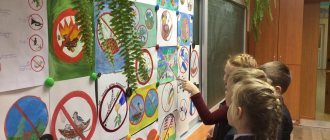Parent meeting on the topic: “Formation of a legal culture among parents of primary schoolchildren”
-XXI century - The century of the child. November 20 is World Children's Rights Day.-December 10—Human Rights Day. That is why I would like to talk to you about the rights of our children, about our rights and responsibilities.
-Nowadays there is a lot of talk about the rights of the child, but there is another side to the same problem - the rights of parents. And before our eyes, the priority right of parents to raise their children is becoming increasingly relevant. It is reflected in the Family Code of the Russian Federation (Articles 63 and 64), which states that parents represent the interests of their children and protect these interests from possible violations. Similar rights are granted to parents by other regulations. Moreover, according to the law, they not only can, but are also obliged to do this, which directly follows from the Constitution, since its 38th article states: “Caring for children, their upbringing is equally the right and responsibility of parents.” The protection of the rights and interests of children rests with their parents. Parents are the legal representatives of their children and act to protect their rights and interests in relations with any persons. The rights of the child are reflected in a document called the Convention on the Rights of the Child. On November 20, 1989, the UN General Assembly adopted the Convention on the Rights of the Child - this is an important document regulating the protection of children's rights throughout the world. The Convention is not a list of children's rights, but a list of the obligations that states have assumed to protect these rights.
-The first document regulating the rights of children was the Declaration of the Rights of the Child, adopted in 1923 by the International Save the Children Union. This document was valid for 36 years.
-By adopting the short Declaration of the Rights of the Child, the UN set a goal: to develop a document on the rights of children that would be binding on states that agreed to sign it. The Convention on the Rights of the Child became just such a document.
-The UN Convention on the Rights of the Child is a document on the rights of the child, consisting of 54 articles, each of which describes a specific right. The Convention recognizes as a child a person under 18 years of age if, according to the laws of the country, the age of majority does not occur earlier.
-When a country signs this Convention, it accepts the responsibility to provide these rights to all children without exception. At the moment, most countries have signed the Convention on the Rights of the Child (our country acceded to this document on July 13, 1990).
What children's rights do you know?
- Now I suggest you divide into groups of 6 people. I will give each group 6 “thinking” hats and a situation. You need to choose your favorite hat and find out your role. Once you assign a role (choose hats), start solving the situation. Remember, you should only come up with theories that are related to your role (hat). (4 groups)
Situation 1.
Mother. Turn the music down immediately! It's already midnight, you'll wake up the whole house!
Son. And I have the right to rest and leisure. I'm used to relaxing with loud music!
Please help your child figure out who is wrong here.
Situation 2.
Student Petrov was running around the class during class. To the teacher’s remark he replied: “So what? I have the right to freedom of movement.”
Please help your child figure out who is wrong here.
Situation 3.
Mother. Son, why didn’t you take out the trash can and go get some bread?
Son. Because the UN prohibits the use of child labor.
Please help your child figure out who is wrong here.
Situation 4.
Our cinema shows films about love, but children under 16 are not allowed to watch them.
Are children's rights to receive information violated?
Parents' answers.
-We got acquainted with children's rights. What are the rights and responsibilities of parents?
Video.(Appendix 1)
-What rights and responsibilities did you hear in the video?
-What documents do you think contain these rights and responsibilities?
Clippings of articles and documents (Appendix 2)(
Article 52 of the Law of the Russian Federation “On Education”; CONSTITUTION OF THE RUSSIAN FEDERATION Article 38, Article 43; FAMILY CODE OF THE RUSSIAN FEDERATION Article 63. Rights and responsibilities of parents for the upbringing and education of children, Article 65. Exercise of parental rights, Article 69. Deprivation of parental rights; ADMINISTRATIVE RESPONSIBILITY OF PARENTS AND OTHER LEGAL REPRESENTATIVES; Criminal Code of the Russian Federation).
-Dear parents, how often do we think about whether we are good parents and whether we cope with our responsibilities? Now we will conduct a test that will reveal what kind of parent you are. Test yourself by answering the questions (yes, no, sometimes). (Appendix 3)
Parents about the rights and responsibilities of school students
Situation 3.
Mother
. Son, why didn’t you take out the trash can and go get some bread?
Son
. Because the UN prohibits the use of child labor.
Please help your child figure out who is wrong here.
Situation 4.
Our cinema shows films about love, but children under 16 are not allowed to watch them.
Are children's rights to receive information violated?
__________________________________________________________________________
Situation 5.
The school council decided that everyone should wear a school uniform. And you are against it.
Are the rights of the child violated?
____________________________________________________________________________
Situation 6.
Every day, you see your neighbor beating his child for some pranks.
Are the rights of the child violated?
____________________________________________________________________________
Parents answer questions.
Classroom teacher
-It has become increasingly difficult lately to find a common language with students’ parents; fewer and fewer teachers prefer to take on the responsibilities of a class teacher. In many families, it is already considered bad manners to consult with teachers about emerging problems, and it is no longer necessary to go to parent-teacher meetings, much less warn the class teacher about this. But our actions must be mutual, since we pursue one goal - to ensure that the upbringing and education of the child is successful.
-Let's remember the main functions of family and school. School is an institution of socialization in which a child gains experience interacting with other people, which is no less important than the sum of knowledge. In fact, our children are undergoing a kind of rehearsal for their future adult life.
Raising children in a family means teaching them how to cope without their parents. You and I often don’t even consult with the child about how he himself wants to resolve this or that situation, without thinking, sometimes in the heat of the moment, we take actions that entail irreversible consequences. Sometimes these consequences lead to our children's delinquency.
Exercise No. 3.
"EXPERIENCE EXCHANGE".
Sitting in groups, each parent says his name and talks about what he could teach his child, what he feels like an expert in, what he can do masterfully (family, home, education).
Exercise No. 4.
“POSTER” (practical work + project defense.).
-And now, I suggest you do practical work, create your own POSTER on the topic of our meeting. Sheet A 5, markers, felt-tip pens, stickers, pictures for a collage are offered to help you.
-Dear parents, how often do we think about whether we are good parents and whether we cope with our responsibilities? Now we will conduct a test that will reveal what kind of parent you are. Test yourself by answering the questions (yes, no, sometimes).
Your psychologist. The work of a psychologist at school.
Scenario for a parent meeting with childrenPlan:
- Meeting the parents.
- Introductory speech by the head on the topic of the parent meeting.
- Student performance.
- Tests for parents.
- Summarizing. Pedagogical advice based on test results.
- Individual conversations. Collection of personal information about students.
Progress of the meeting:
- Parents are given forms to fill out information about family composition.
- The teacher introduces parents to the topic of the meeting.
- Student performance.
1st student: Today we will tell you about some of the rights of the child. 2nd student: A child is every human being under the age of 18, unless national laws provide for majority at an earlier age. 1 student: The participating states recognize that every child has an inalienable right to life. Student 2: Protecting the rights and interests of children rests with their parents. Parents are the legal representatives of their children and act to protect their rights and interests in relations with any persons. Reader 1: As soon as you were born into the world, your first right is: Receive, to be proud of it, your personal name. Reader 2: It is very difficult to live alone in the world. Use your right to live with Mom and with Dad everywhere, guys. (Children hand out and show drawings of their family.) Reader 3: There is also the right to remember to think and create and your thoughts to others, if you want to give them. (Children show their crafts and creative works: crosswords, essays, etc.) Reader 4: I’m not happy with the sprout And I’m not that strong yet, But don’t you dare hurt me We have such a law. (A skit invented by the children is played out here.) Reader 5: If you have a fever, your whole body aches, and there’s no time for playing at all, then calling a doctor for help is also a child’s right. Reader 6: In order to make friends with science, With a book in my small hand, I take advantage of the right to study in my native language. Reader 7: I grew up, I took books and I went to first grade. All children go to school - We have this right. (A couple of children dance the school waltz.) Reader 8: I can celebrate my children's holiday just like an adult. If I get hungry, I have the right to receive food. Reader 1: Whether you are weak or strong, White or black, it’s all the same. You were born to be happy. This right is given to everyone. (The last words are spoken by the readers in chorus) Children sing the song “In secret to the whole world.”
4. Tests for parents. A) What kind of parents are we? Do we often think about whether we are good parents and whether we cope with our responsibilities as educators? So what kind of parents are we? Test yourself by answering the questions (yes, no, sometimes).
- Do you follow magazine articles, television and radio programs on parenting issues? Do you read books on this topic from time to time?
- Your child did something. In this case, do you wonder whether his behavior is a result of your upbringing?
- Are you and your spouse on the same page when it comes to raising children?
- If a child offers you his help, will you accept it, even if this may delay the matter, or even stop altogether?
- Do you use the form of prohibition or order only when it is really necessary?
- Do you think that consistency is one of the basic pedagogical principles?
- Are you aware that a child's environment has a significant influence on him?
- Do you recognize that sports and physical education are of great importance for the harmonious development of a child?
- Can you not order your child, but ask him for something?
- Is it unpleasant for you to get rid of your child with a phrase like: “I don’t have time” or “Wait until I finish work?”
For each positive answer, score yourself 2 points, for the answer “sometimes” - 1, and for a negative answer - 0. Less than 6 points. You have a rather vague idea of real upbringing. And although they say that it’s never too late to start, we advise you not to rely on this saying, but, without delay, start improving your knowledge in this area. From 7 to 14 points. You don't make major mistakes in parenting, but you still have something to think about. And you can start by devoting the next weekend entirely to the children, forgetting for a while your friends and production problems. And rest assured, your children will fully reward you for this. More than 15 points. You cope well with your parental responsibilities. Still, wouldn't it be possible to improve something else a little?
B) Are you a good parent? You can answer the questions of this test “yes”, “no”, “I don’t know”. So:
- You often react to some of your child’s actions with an “explosion” and then regret it.
- Sometimes you take help or advice from friends when you don't know how to respond to your child's behavior.
- Your intuition and experience are the best advisers in raising a child.
- Sometimes you happen to trust your child with a secret that you would not tell anyone else.
- You are offended by other people's negative opinions about your child.
- You happen to ask your child for forgiveness for your behavior.
- You believe that a child should not have secrets from his parents.
- You notice differences between your character and the character of your child, which sometimes surprise (delight) you.
- You worry too much about your child's troubles or failures.
- You may resist buying an interesting toy for your child (even if you have the money) because you know the house is full of them.
- You think that up to a certain age, the best educational argument for a child is physical punishment (belt).
- Your child is exactly what you dreamed of.
- Your child gives you more trouble than joy.
- Sometimes you feel like your child is teaching you new thoughts and behaviors.
- You have conflicts with your own child.
Calculation of results For each answer “yes” to questions: 2, 4, 6, 8, 10, 12, 14, as well as “no” to questions: 1, 3, 5, 7, 9, 11, 13, 15, you receive 10 points. For every “I don’t know” you get 5 points. Count up your points. 100 - 150 points. You have great opportunities to understand your own child correctly. Your views and judgments are your allies in solving various educational problems. If this is accompanied by such open and tolerant behavior in practice, you can be recognized as an example worthy of emulation. For the ideal you need one small step. This could be your child's opinion. Will you take the risk? 50 - 99 points. You are on the right road to better understanding your own child. You can resolve your temporary difficulties or problems with your child by starting with yourself. And don’t try to make excuses about lack of time or your child’s nature. There are several issues that you have influence over, so try to use it. And don’t forget that understanding does not always mean accepting. Not only the child, but also your own personality too. 0 - 49 points. It seems that one can only sympathize more with your child than with you, since he did not end up with a parent - a good friend and guide on the difficult road of gaining life experience. But all is not lost. If you really want to do something for your child, try something different. Maybe you can find someone who can help you with this. It will not be easy, but in the future it will return with gratitude and the established life of your child.
5. The ABCs of education (Advice to parents). (Education of schoolchildren, No. 8, 2001)
- Sometimes children take all school troubles too personally. Constantly teach them to distinguish between what is important and what is not so important.
- Everyone knows that reading while lying down is bad; it damages your eyesight. As a last resort, allow children to read while sitting in bed.
- Do you know about the Sukhomlinsky regime? Don’t do homework during the day or evening, but get up at five o’clock and study in the morning. Some kids really like it.
- Pay close attention to whether you are giving one child more attention and affection than the other. Children are extremely scrupulous in matters of justice.
- Remember, young children have not yet developed a sense of humor. You joked, but the child was offended. This is a case when you shouldn't experiment. A sense of humor will come with time.
- Children try smoking at 10-11 years old. This is the best time to talk about the dangers of tobacco. Show your son how upset you are. Don't threaten punishment - this will make smoking an attractive heroic act. Tell us how people die from lung cancer.
- Remember how long ago you heard children's laughter in your home? The more often children laugh, the better their upbringing goes.
- There are two peak periods for journaling in human life: 15 and 32 years. Respect the teenager keeping a journal. If you enter the room and see that your daughter or son is writing something, leave the child and don’t ask anything.
- To prevent your teenager from smoking, take care of his sports activities. Does he have a soccer ball, a bicycle, a tennis racket? Teenagers who are athletes usually do not smoke.
- Know, after thinking, to refuse any advice, including the advice of the Parents' Newspaper.
We are not the masters of our children's lives. We cannot know their fate. We don't fully know what is good and what is bad for their future. Therefore, we will be more careful in all decisions that may affect the child’s path.
Memo for parents Dear parents! Let these rules, verified by life, help you in raising a child, in establishing good relationships with him, in strengthening your authority, mutual respect and love. This is possible if in your family:
- Trust is the basic rule.
- You always tell your child the truth.
- Try to be an example for the child.
- You respect the child as an individual who has the right to his own point of view.
- Consult with your child.
- Don't deceive your child.
- Learn to correctly evaluate your actions and the actions of other people.
- Do not set a goal to achieve complete obedience from the first word, give the child the opportunity to see whether he is right or wrong.
- If your child needs help, put things off until later.
- The way out of a hopeless situation is a joke.
- TV is good, but nature is better.
- Learning and reading are a joy for the whole family. Read aloud regularly.
- When judging a child for an action, remember yourself at his age.
- Know your child's friends and invite them into the house.
- In the evening, discuss with the whole family how your day went.
Techniques for controlling the organ of behavior Organizing an anti-crisis environment for the child Where we talk to the child, whether we are sitting or standing, who is sitting next to us - all this is part of the structure of the environment. This can create a warm, informal, friendly or cold, business-like, authoritarian atmosphere of communication. Deliberate ignoring If we do not react to unpleasant aspects of a child’s behavior, but calmly listen to him, then this strengthens the process of influence. It is necessary not only not to react to these aspects of behavior, but also to support the child if he begins to behave correctly. Hint You can tell your child how to behave or what behavior is unacceptable, using, for example, the words “Stop playing for now,” or non-verbal cues, such as a glance or a nod, reminding the child of his responsibilities. This is a simple, uncritical comment that helps the child take the next step. Emotional Support Like praise, emotional support helps improve a child's self-esteem. When a child's condition is caused by feelings of insecurity, fear or anger about some life situation, he may especially need your attention and care to solve the problem. Help in difficult situations When we know that a child cannot start or finish a task without additional help, we can help him overcome the first difficult steps. Nonverbal methods of influence Nonverbal influence includes various techniques: for example, “being nearby” and “physical contact”. Sometimes, in order to calm down, it is enough for a child to simply have an adult nearby. Physical contact is a very important method of influence. Shaking your hand or patting your child on the shoulder can help calm your child down. Changing Direction Changing the direction of a child or group's activities helps them calm down and return to a normal routine. When using this method, the child's energy and attention are switched to another type of activity, thanks to which he begins to control his behavior. Direct instructions With the further development of the crisis state, the child is less and less able to make reasonable decisions, so he needs to be given direct instructions. Direct instructions tell the child clearly and unambiguously what he should do. These could be comments, reminders about rules of behavior or daily routine, and instructions. Break When a child is upset or irritated, you need to ask him to go to a calm or quiet place so that he can come to his senses.
6. Individual conversations. Collection of personal information about students who are “difficult” children
EDUCATIONAL INSTITUTION “VITEBSK STATE CITY SOCIAL AND PEDAGOGICAL CENTER”




